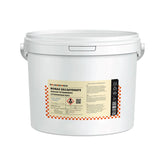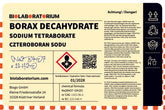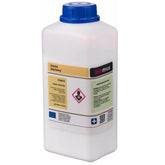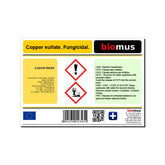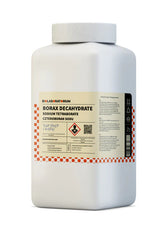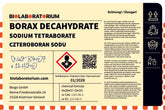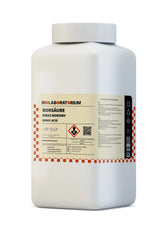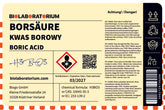Magnesium nitrate – Versatile helper for technology and laboratory
Magnesium nitrate, also known as Mg(NO₃)₂·6H₂O, is an important chemical reagent with numerous applications in engineering and science. As a pure salt with a crystalline structure, it offers a wide range of uses, from technical processes to analytical laboratory applications. In this blog post, we take a closer look at the properties and uses of magnesium nitrate.
Properties of magnesium nitrate
Magnesium nitrate is a colorless, crystalline salt that is highly soluble in water. It has a molar mass of 256.41 g/mol and a density of 1.47 g/cm³. The melting point is 89°C, and the boiling point is 129°C. Chemically, it is a magnesium salt of nitric acid that contains six molecules of crystal water.
Due to its high solubility in water, magnesium nitrate is excellent for aqueous solutions and reactions. Furthermore, it is also soluble in organic solvents such as ethanol or acetone, which opens up further applications.
Technical applications of magnesium nitrate
In technology, magnesium nitrate has diverse applications. One of the main areas of use is the production of fertilizers. As a source of magnesium and nitrogen, it is used in agriculture to supply soils and plants with essential nutrients.
Magnesium nitrate also plays an important role in pyrotechnics. It serves as an oxidizing agent and gives fireworks their characteristic white color. Additionally, it is used in the production of matches, explosives, and other pyrotechnic products.
Further technical applications of magnesium nitrate include:
Textile finishing
Magnesium nitrate is used in textile finishing to impregnate, bleach, or dye fabrics. It improves the moisture absorption and color fastness of textiles.
Ceramic production
In the ceramics industry, magnesium nitrate serves as an additive to influence the properties of ceramic products such as strength, porosity, and coloration.
Metalworking
In metal processing, magnesium nitrate is used as a pickling agent, degreaser, or corrosion inhibitor.
Medical applications
Magnesium nitrate also plays a role in medicine, for example as a component of medications or in the production of dressing materials.
Analytical applications of magnesium nitrate
In addition to technical applications, magnesium nitrate is also of great importance in analytical laboratory applications. As a pure reagent, it offers numerous advantages:
Qualitative Analysis
Magnesium nitrate can be used in qualitative analysis to detect the presence of magnesium. Through reactions with specific reagents, magnesium can be reliably identified.
Quantitative Analysis
Magnesium nitrate is excellent as a standard substance for quantitative analyses. Precise weighing and titration allow for accurate determination of magnesium content in samples.
Complex formation
Due to its ability to form stable complexes, magnesium nitrate is used in complexometry. It serves for the determination of metal ions such as calcium, zinc, or copper.
Acid-base titrations
In acid-base titrations, magnesium nitrate can be used as a buffer system to control the pH value and create stable measurement conditions.
Preparative applications
Last but not least, magnesium nitrate is also used in preparative laboratory applications, such as for the synthesis of magnesium compounds or as a drying agent.
Conclusion
Magnesium nitrate is a versatile chemical reagent with numerous applications in technology and science. Whether as a fertilizer, firework ingredient, or analytical reagent – this crystalline salt offers a wide range of uses. With its excellent solubility properties and the ability to form stable complexes, magnesium nitrate is an indispensable aid in the laboratory and industry.

